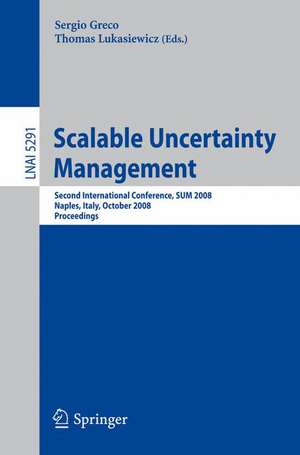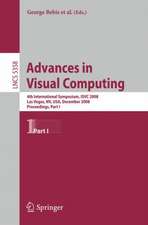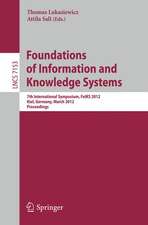Scalable Uncertainty Management: Second International Conference, SUM 2008, Naples, Italy, October 1-3, 2008, Proceedings: Lecture Notes in Computer Science, cartea 5291
Editat de Sergio Grecoen Limba Engleză Paperback – 19 sep 2008
Din seria Lecture Notes in Computer Science
- 20%
 Preț: 1061.55 lei
Preț: 1061.55 lei - 20%
 Preț: 307.71 lei
Preț: 307.71 lei - 20%
 Preț: 438.69 lei
Preț: 438.69 lei - 20%
 Preț: 645.28 lei
Preț: 645.28 lei -
 Preț: 410.88 lei
Preț: 410.88 lei - 15%
 Preț: 580.46 lei
Preț: 580.46 lei - 17%
 Preț: 427.22 lei
Preț: 427.22 lei - 20%
 Preț: 596.46 lei
Preț: 596.46 lei -
 Preț: 381.21 lei
Preț: 381.21 lei - 20%
 Preț: 353.50 lei
Preț: 353.50 lei - 20%
 Preț: 1414.79 lei
Preț: 1414.79 lei - 20%
 Preț: 309.90 lei
Preț: 309.90 lei - 20%
 Preț: 583.40 lei
Preț: 583.40 lei - 20%
 Preț: 1075.26 lei
Preț: 1075.26 lei - 20%
 Preț: 310.26 lei
Preț: 310.26 lei - 20%
 Preț: 655.02 lei
Preț: 655.02 lei - 20%
 Preț: 580.93 lei
Preț: 580.93 lei - 20%
 Preț: 340.32 lei
Preț: 340.32 lei - 15%
 Preț: 438.59 lei
Preț: 438.59 lei - 20%
 Preț: 591.51 lei
Preț: 591.51 lei - 20%
 Preț: 649.49 lei
Preț: 649.49 lei - 20%
 Preț: 337.00 lei
Preț: 337.00 lei -
 Preț: 449.57 lei
Preț: 449.57 lei - 20%
 Preț: 607.39 lei
Preț: 607.39 lei - 20%
 Preț: 1024.44 lei
Preț: 1024.44 lei - 20%
 Preț: 579.30 lei
Preț: 579.30 lei - 20%
 Preț: 763.23 lei
Preț: 763.23 lei - 20%
 Preț: 453.32 lei
Preț: 453.32 lei - 20%
 Preț: 575.48 lei
Preț: 575.48 lei - 20%
 Preț: 585.88 lei
Preț: 585.88 lei - 20%
 Preț: 825.93 lei
Preț: 825.93 lei - 20%
 Preț: 763.23 lei
Preț: 763.23 lei - 17%
 Preț: 360.19 lei
Preț: 360.19 lei - 20%
 Preț: 1183.14 lei
Preț: 1183.14 lei - 20%
 Preț: 340.32 lei
Preț: 340.32 lei - 20%
 Preț: 504.57 lei
Preț: 504.57 lei - 20%
 Preț: 369.12 lei
Preț: 369.12 lei - 20%
 Preț: 583.40 lei
Preț: 583.40 lei - 20%
 Preț: 343.62 lei
Preț: 343.62 lei - 20%
 Preț: 350.21 lei
Preț: 350.21 lei - 20%
 Preț: 764.89 lei
Preț: 764.89 lei - 20%
 Preț: 583.40 lei
Preț: 583.40 lei -
 Preț: 389.48 lei
Preț: 389.48 lei - 20%
 Preț: 341.95 lei
Preț: 341.95 lei - 20%
 Preț: 238.01 lei
Preț: 238.01 lei - 20%
 Preț: 538.29 lei
Preț: 538.29 lei
Preț: 339.47 lei
Preț vechi: 424.34 lei
-20% Nou
Puncte Express: 509
Preț estimativ în valută:
64.96€ • 67.41$ • 54.30£
64.96€ • 67.41$ • 54.30£
Carte tipărită la comandă
Livrare economică 15-29 martie
Preluare comenzi: 021 569.72.76
Specificații
ISBN-13: 9783540879923
ISBN-10: 3540879927
Pagini: 401
Ilustrații: XI, 401 p.
Dimensiuni: 155 x 235 x 28 mm
Greutate: 0.61 kg
Ediția:2008
Editura: Springer Berlin, Heidelberg
Colecția Springer
Seriile Lecture Notes in Computer Science, Lecture Notes in Artificial Intelligence
Locul publicării:Berlin, Heidelberg, Germany
ISBN-10: 3540879927
Pagini: 401
Ilustrații: XI, 401 p.
Dimensiuni: 155 x 235 x 28 mm
Greutate: 0.61 kg
Ediția:2008
Editura: Springer Berlin, Heidelberg
Colecția Springer
Seriile Lecture Notes in Computer Science, Lecture Notes in Artificial Intelligence
Locul publicării:Berlin, Heidelberg, Germany
Public țintă
ResearchCuprins
Consistent Query Answering: The First Ten Years.- Heavy Tails and Web Models.- Managing Probabilistic Data with MystiQ: The Can-Do, the Could-Do, and the Can’t-Do.- Frequent Itemset Mining from Databases Including One Evidential Attribute.- Evaluating Trustworthiness from Past Performances: Interval-Based Approaches.- A Comparative Study of Six Formal Models of Causal Ascription.- An Efficient Algorithm for Naive Possibilistic Classifiers with Uncertain Inputs.- Transitive Observation-Based Causation, Saliency, and the Markov Condition.- A Family of Tolerant Antidivision Operators for Database Fuzzy Querying.- Uncertainty Management for the Retrieval of Economic Information from Distributed Markets.- Loopy Propagation in a Probabilistic Description Logic.- On the Performance of Fuzzy Data Querying.- Tractable Reasoning with Bayesian Description Logics.- Approximate Reasoning for Efficient Anytime Induction from Relational Knowledge Bases.- Fusing Uncertain Structured Spatial Information.- A Neuro Fuzzy Approach for Handling Structured Data.- A Framework for the Partial Evaluation of SPARQL Queries.- An Evolutionary Perspective on Approximate RDF Query Answering.- Clustering Uncertain Data Via K-Medoids.- Speeding Up the NRA Algorithm.- Uncertain Context Modeling of Dimensional Ontology Using Fuzzy Subset Theory.- A Personalized Approach to Experience-Aware Service Ranking and Selection.- Performance Evaluation of Algorithms for Soft Evidential Update in Bayesian Networks: First Results.- Optimization of Queries over Interval Probabilistic Data.- Polynomial Time Queries over Inconsistent Databases.- Using OBDDs for Efficient Query Evaluation on Probabilistic Databases.- A Logical Framework to Reinforcement Learning Using Hybrid Probabilistic Logic Programs.- On theRelationship between Hybrid Probabilistic Logic Programs and Stochastic Satisfiability.- Scaling Most Probable World Computations in Probabilistic Logic Programs.- Measuring the Ignorance and Degree of Satisfaction for Answering Queries in Imprecise Probabilistic Logic Programs.
Textul de pe ultima copertă
This book constitutes the refereed proceedings of the Second International Conference on Scalable Uncertainty Management, SUM 2008, held in Naples, Italy, in Oktober 2008.
The 27 revised full papers presented together with the extended abstracts of 3 invited talks/tutorials were carefully reviewed and selected from 42 submissions. The papers address artificial intelligence researchers, database researchers, and practitioners to demonstrate theoretical techniques required to manage the uncertainty that arises in large scale real world applications and to cope with large volumes of uncertainty and inconsistency in databases, the Web, the semantic Web, and artificial intelligence in general.
The 27 revised full papers presented together with the extended abstracts of 3 invited talks/tutorials were carefully reviewed and selected from 42 submissions. The papers address artificial intelligence researchers, database researchers, and practitioners to demonstrate theoretical techniques required to manage the uncertainty that arises in large scale real world applications and to cope with large volumes of uncertainty and inconsistency in databases, the Web, the semantic Web, and artificial intelligence in general.













